2019年《英语学科知识与教学能力》(高级中学)
2019上半年《英语学科知识与教学能力(高中》教师资格试题及答案
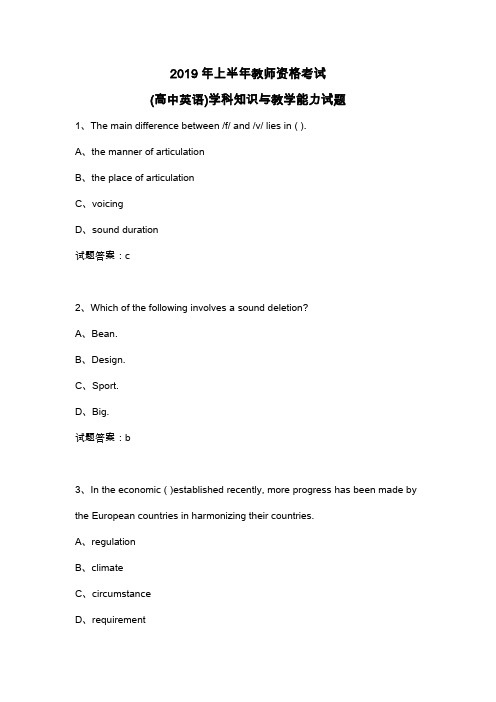
2019年上半年教师资格考试(高中英语)学科知识与教学能力试题1、The main difference between /f/ and /v/ lies in ( ).A、the manner of articulationB、the place of articulationC、voicingD、sound duration试题答案:c2、Which of the following involves a sound deletion?A、Bean.B、Design.C、Sport.D、Big.试题答案:b3、In the economic ( )established recently, more progress has been made by the European countries in harmonizing their countries.A、regulationB、climateC、circumstanceD、requirement4、Smoking heavily at home will expose children to ( )their health.A、multipleB、surplusC、durableD、excessive试题答案:d5、Which of the following pairs of words are gradable antonyms?A、Buy and sell.B、Big and small.C、Male and female.D、Red and green.试题答案:b6、Naturally, she ( )that once there was a new film everybody would be eager to go and see it.A、had assumedB、assumedC、has assumedD、was assuming7、If he had fought in the First World War, he might have returned ( ).A、a different manB、with a different manC、as a different manD、to be a different man试题答案:c8、In fact, they would rather have left for London ( )in Birmingham.A、to stayB、in order to stayC、than have stayedD、instead of having stayed试题答案:c9、What kind of speech act is performed in utterance “Come round on Saturday”when it is said as an invitation rather than a demand?A、Direct speech act.B、Locutionary act.C、Indirect speech act.D、Perlocutionary act.试题答案:c10、By asking the question,“Can you list your favorite food in English?”, the teacher is using the technique of ( ).A、elicitationB、monitoringC、promptingD、recasting试题答案:a11、If a teacher wants to check how much students have learned at the end ofa term, he/she would give them a(n) ( ).A、diagnostic testB、placement testC、proficiency testD、achievement test试题答案:d12、What learning style does Xiao Li exhibit if she tries to understand every single word when listening to a passage?A、Field-dependence.B、Intolerance of Ambiguity.C、Risk-taking.D、Field-independence.试题答案:b13、If a teacher asks students to put jumbled sentences in order in a reading class, he/she intends to develop their ability of ( ).A、word-guessing through contextB、summarizing the main ideaC、understanding textual coherenceD、scanning for detailed information试题答案:c14、When a teacher says “What do you mean by that?”,he/she is asking the student for ( ).A、repetitionB、suggestionC、introductionD、clarification试题答案:d15、When a teacher says u “You 'd better talk in a more polite way when speaking to the elderly.”,he/she is drawing the students’attention to the ( )of language use.A、fluencyB、complexityC、accuracyD、appropriacy试题答案:d16、Which of the following is a display question?A、What part of speech is “immense”?B、How would you comment on this report?C、Why do you think Hemingway is a good writer?D、What do you think of the characters in this novel?试题答案:a17、Which of the following represents a contextualized way of practising “How often ...”?A、Make some sentences with“how often”.B、Use“how often”and the words given to make a sentence.C、I go shopping twice a week. How often do you go shopping?D、Please change the statement into a question with “how often”.试题答案:c18、Which of the following are controlled activities in an English class?A、Reporting, role-play and games.B、Reading aloud, dictation and translation.C、Role-play, problem solving and discussion.D、Information exchange, narration and interview.试题答案:b19、The ( )is designed according to the morphological and syntactic aspects ofa language.A、structural syllabusB、situational syllabusC、skill-based syllabusD、content-based syllabus试题答案:a阅读The number of Americans who read books has been declining for thirty years, and those who do read have become proud of, even a bit over-identified with, the enterprise. Alongside the tote bags you can find T-shirts, magnets, and buttons printed or sewn with covers of classic novels; the Web site Etsy sells tights printed with poems by Emily Dickinson. A spread in The Paris Review featured literature-inspired paint-chip colors. The merchandising of reading has a curiously undifferentiated flavor, as if what you read mattered less than that you read. In this climate of embattled bibliophilia, a new subgenre of books about books has emerged, a mix of literary criticism, autobiography, self-help, and immersion journalism: authors undertake reading stunts to prove that reading—anything—still matters.“I thought of my adventure as Off-Road or Extreme Reading,”Phyllis Rose writes in “The Shelf: From LEQ to LES,”the latest stunt book, in which she reads through a more or less random shelf of library books. She compares her voyage, to Ernest Shackleton’s explorations in the Antarctic. “However, I like to sleep under a quilt with my head on a goose down pillow,”she writes. “So I would read my way into the unknown一into the pathless wastes, into thinair, with no reviews, no best-seller lists, no college curricula, no National Book Awards or Pulitzer Prizes, no ads, no publicity, not even word of mouth to guide me.”She is not the first writer to set off on armchair expedition. A. J. Jacobs, a self-described “human guinea pig,”spent a year reading the encyclopedia for “The Know-It-All: One Man’s Humble Quest to Become the Smartest Person in the World”(2004). Ammon Shea read all of the Oxford English Dictionary for his book “Reading the OED: One Man, One Year, 21, 730 Pages”(2008). In “The Whole Five Feet”(2010), Christopher Beha made his way through the Harvard Classics during a year in which he suffered serious illness and had a death in the family. In “Howard’s End Is on the Landing”(2010), Susan Hill limited herself to reading only the books that she already owned. Such “extreme reading”requires special personal traits: perseverance, stamina, a craving for self- improvement, and obstinacy.Rose fits the bill. A retired English professor, she is the author of popular biographies of Virginia Woolf and Josephine Baker, as well as “The Year of Reading Proust”(1997), a memoir of her family life and the manners and mores of the Key West literary scene. Her best book is “Parallel Lives”(1983), a group biography of five Victorian marriages. (It is filled with marvellous details and set pieces, like the one in which John Ruskin, reared on hairless sculptures of female nudes, defers consummating his marriage to Effie Gray for so long that she sues for divorce.) Rose is consistently generous,knowledgeable, and chatty, with a knock for connecting specific incidents to large social trends. Unlike many biblio-memoirists, she loves network television and is un-nostalgic about print; in “The Shelf’she says that she prefers her e-reader to certain moldy paperbacks.The way most of us choose our reading today is simple. Someone posts a link, and we click on it. We set out to buy one book, and Amazon suggests that we might like another. Friends and retailers know our preferences, and urge recommendations on us. The bookstore and the library could assist you, too—the people who work there may even know you and track your habits—but they are organized in an impersonal way. Shelves and open stacks offer not only immediate access to books but strange juxtapositions. Arbitrary classification breeds surprises—Nikolai Gogol next to William Golding, Clarice Lispector next to Penelope Lively. The alphabet has no rationale, agenda, or preference.20、What can be inferred from Paragraph 1 about the author’s opinion on reading?A、What really matters is the fact that you read.B、An emphasis should be placed on what you read.C、The merchandising of reading can boost book sales.D、Reading as a serious undertaking should not be merchandised.21、Why does Phyllis Rose compare her reading to Ernest Shackleton’s explorations in the Antarctic?A、To emphasize the adventurous and stirring experience of reading.B、To emphasize the role of reading in broadening people’s horizon.C、To emphasize the amusement in reading without specific guidance.D、To emphasize the challenges in reading books of varying categories.22、Which of the following is closest in meaning to underlined phrase “human guinea pig”in Paragraph 3?A、A person used in experiments.B、An uneducated person.C、A lazy person.D、A vulnerable person.23、Why is Rose considered a good instance to manifest “extreme reading”?A、People’s interest in reading needs to be inspired.B、Most people do not know what they should read.C、She knows how to relieve her mental suffering via reading.D、She has special personal traits needed for “extreme reading”.24、In what sense is the arbitrary classification of books considered to be impersonal?A、It brings about surprises.B、It fails to track readers’habits.C、It ignores the content of books.D、It fails to consider reader’s preferences.试题答案:[['D'],['C'],['A'],['D'],['A']]21、If you have got kids, here is a nasty truth: they are probably not very special, that is, they are average, ordinary, and unremarkable. Consider the numbers of those applications your daughter is sending to Ivy League schools, for instance. There are more than a quarter of a million other kids aiming for the same eight colleges at the same time, and less than 9% of them will make the cut. And those hours you spend coaching Little League because you just know your son’s sweet swing will take him to the professionals. There are 2.4 million other Little Leaguers out there, and there are exactly 750 openings for major league ballplayers at the beginning of each season. That gives him a 0.0313% chance of reaching the big clubs. The odds are just as long for the other dreams you’ve had for your kids: your child the billionaire, the Broadway star, the Rhodes scholar. Most of those things are never going to happen.The kids are paying the price for parents’delusions. In public schools, some students are bringing home 17.5 hours of homework per week or 3.5 per school night and it’s hard to see how they have time to do it. From 2004 to2014, the number of children participating in up to three hours of after-school activities on any given day rose from 6.5 million to 10.2 million. And all the while, the kids are being fed a promise—that they can be tutored and coached, pushed and tested, hot- housed and advance placed until success is assured.At last, a growing chorus of educators and psychologists is saying, “Enough!”Somewhere between the self-esteem building of going for the gold and the self esteem crushing of the Ivy-or-die ethos there has to be a place where kids can breathe, where they can have the freedom to do what they love and where parents accustomed to pushing their children to excel can shake off the newly defined shame of having raised an ordinary child.If the system is going to be fixed, it has to start, no surprise, with the parents. For them, the problem isn’t merely the expense of the tutors, the chore of the homework checking and the constant search for just the right summer program. It’s also the sweat equity that comes from agonizing over every exam, grieving over every disappointing grade—becoming less a guide in a child’s academic career than an intimate fellow traveler.The first step for parents is accepting that they have less control over their children’s education than they think they do—a reality that can be both sobering and liberating. You can sign your kids up for ballet camp or violin immersion all you want, but if they’re simply doing what they’re told instead of doing what they love, they’ll take it only so far.Ultimately, there’s a much larger national conversation that needs to be had about just what higher education means and when it’s needed at all. Four years of college has been sold as being a golden ticket in the American economy, and to an extent that’s true.But pushing all kids down the bachelor’s path ensures not only that some of them will lose their way but also that critical jobs that require a two-year or less—skilled trades, some kinds of nursing, computer technology, airline mechanics and more—will go unfilled.There will never be a case to be made for a culture of academic complacency or the demolition of the meritocracy. It can be fulfilling for kids to chase a ribbon, as long as it’s a ribbon the child really wants. And the very act of making that effort can bring out the best in anyone’s work.But we cheat ourselves, and worse, we cheat our kids, if we view life as a single straight-line race in which one one-hundredth of the competitors finish in the money and everyone else loses. We will all be better off if we recognize that there are a great many races of varying lengths and outcomes. The challenge for parents is to help their children find the one that’s right for them. Which of the following factors deprives the kids of freedom to do what they love?A、3.5 hours of school assignments set by their teachers every day.B、The educational reforms made by the public schools they attend.C、The growing number of peers taking part in off-campus activities.D、Their parents’unrealistic wish for them to have a promising future.What are parents supposed to do to alter the current educational system?A、To pay for their kids’education.B、To take up all the household chores.C、To provide guidance to their children.D、To push their children to excel at exams.According to the author, which of the following perceptions should parents adopt concerning their kids’education?A、They should be their kids’companions on their journey to academic excellence.B、They should realize the fact that most children would remain mediocre despite their wills.C、They should feel relieved if they don’t have to pay for their kid’s off-school art lessons.D、They should be their kids’career director rather than help them find a right path to walk on.What does the underlined word “one”in the last paragraph refer to?A、Race.B、Length.C、Challenge.D、Outcome.试题答案:[['D'],['C'],['B'],['A']]22、根据题目要求完成下列任务,用中文作答。
(完整word版)2019上半年《英语学科知识与教学能力(高中》教师资格试题及答案,推荐文档

2019年上半年教师资格考试(高中英语)学科知识与教学能力试题1、The main difference between /f/ and /v/ lies in ( ).A、the manner of articulationB、the place of articulationC、voicingD、sound duration试题答案:c2、Which of the following involves a sound deletion?A、Bean.B、Design.C、Sport.D、Big.试题答案:b3、In the economic ( )established recently, more progress has been made by the European countries in harmonizing their countries.A、regulationB、climateC、circumstanceD、requirement4、Smoking heavily at home will expose children to ( )their health.A、multipleB、surplusC、durableD、excessive试题答案:d5、Which of the following pairs of words are gradable antonyms?A、Buy and sell.B、Big and small.C、Male and female.D、Red and green.试题答案:b6、Naturally, she ( )that once there was a new film everybody would be eager to go and see it.A、had assumedB、assumedC、has assumedD、was assuming7、If he had fought in the First World War, he might have returned ( ).A、a different manB、with a different manC、as a different manD、to be a different man试题答案:c8、In fact, they would rather have left for London ( )in Birmingham.A、to stayB、in order to stayC、than have stayedD、instead of having stayed试题答案:c9、What kind of speech act is performed in utterance “Come round on Saturday”when it is said as an invitation rather than a demand?A、Direct speech act.B、Locutionary act.C、Indirect speech act.D、Perlocutionary act.试题答案:c10、By asking the question,“Can you list your favorite food in English?”, the teacher is using the technique of ( ).A、elicitationB、monitoringC、promptingD、recasting试题答案:a11、If a teacher wants to check how much students have learned at the end of a term, he/she would give them a(n) ( ).A、diagnostic testB、placement testC、proficiency testD、achievement test试题答案:d12、What learning style does Xiao Li exhibit if she tries to understand every single word when listening to a passage?A、Field-dependence.B、Intolerance of Ambiguity.C、Risk-taking.D、Field-independence.试题答案:b13、If a teacher asks students to put jumbled sentences in order in a reading class, he/she intends to develop their ability of ( ).A、word-guessing through contextB、summarizing the main ideaC、understanding textual coherenceD、scanning for detailed information试题答案:c14、When a teacher says “What do you mean by that?”,he/she is asking the student for ( ).A、repetitionB、suggestionC、introductionD、clarification试题答案:d15、When a teacher says u “You 'd better talk in a more polite way when speaking to the elderly.”,he/she is drawing the students’attention to the ( )of language use.A、fluencyB、complexityC、accuracyD、appropriacy试题答案:d16、Which of the following is a display question?A、What part of speech is “immense”?B、How would you comment on this report?C、Why do you think Hemingway is a good writer?D、What do you think of the characters in this novel?试题答案:a17、Which of the following represents a contextualized way of practising “How often ...”?A、Make some sentences with“how often”.B、Use“how often”and the words given to make a sentence.C、I go shopping twice a week. How often do you go shopping?D、Please change the statement into a question with “how often”.试题答案:c18、Which of the following are controlled activities in an English class?A、Reporting, role-play and games.B、Reading aloud, dictation and translation.C、Role-play, problem solving and discussion.D、Information exchange, narration and interview.试题答案:b19、The ( )is designed according to the morphological and syntactic aspects of a language.A、structural syllabusB、situational syllabusC、skill-based syllabusD、content-based syllabus试题答案:a阅读The number of Americans who read books has been declining for thirty years, and those who do read have become proud of, even a bit over-identified with, the enterprise. Alongside the tote bags you can find T-shirts, magnets, and buttons printed or sewn with covers of classic novels; the Web site Etsy sells tights printed with poems by Emily Dickinson. A spread in The Paris Review featured literature-inspired paint-chip colors. The merchandising of reading has a curiously undifferentiated flavor, as if what you read mattered less than that you read. In this climate of embattled bibliophilia, a new subgenre of books about books has emerged, a mix of literary criticism, autobiography, self-help, and immersion journalism: authors undertake reading stunts to prove that reading—anything—still matters.“I thought of my adventure as Off-Road or Extreme Reading,”Phyllis Rose writes in “The Shelf: From LEQ to LES,”the latest stunt book, in which she reads through a more or less random shelf of library books. She compares her voyage, to Ernest Shackleton’s explorations in the Antarctic. “However, I like to sleep under a quilt with my head on a goose down pillow,”she writes. “So I would read my way into the unknown一into the pathless wastes, into thin air, with noreviews, no best-seller lists, no college curricula, no National Book Awards or Pulitzer Prizes, no ads, no publicity, not even word of mouth to guide me.”She is not the first writer to set off on armchair expedition. A. J. Jacobs, a self-described “human guinea pig,”spent a year reading the encyclopedia for “The Know-It-All: One Man’s Humble Quest to Become the Smartest Person in the World”(2004). Ammon Shea read all of the Oxford English Dictionary for his book “Reading the OED: One Man, One Year, 21, 730 Pages”(2008). In “The Whole Five Feet”(2010), Christopher Beha made his way through the Harvard Classics during a year in which he suffered serious illness and had a death in the family. In “Howard’s End Is on the Landing”(2010), Susan Hill limited herself to reading only the books that she already owned. Such “extreme reading”requires special personal traits: perseverance, stamina, a craving for self- improvement, and obstinacy.Rose fits the bill. A retired English professor, she is the author of popular biographies of Virginia Woolf and Josephine Baker, as well as “The Year of Reading Proust”(1997), a memoir of her family life and the manners and mores of the Key West literary scene. Her best book is “Parallel Lives”(1983), a group biography of five Victorian marriages. (It is filled with marvellous details and set pieces, like the one in which John Ruskin, reared on hairless sculptures of female nudes, defers consummating his marriage to Effie Gray for so long that she sues for divorce.) Rose is consistently generous, knowledgeable, and chatty, with a knock for connecting specific incidents to large social trends. Unlike manybiblio-memoirists, she loves network television and is un-nostalgic about print; in “The Shelf’she says that she prefers her e-reader to certain moldy paperbacks.The way most of us choose our reading today is simple. Someone posts a link, and we click on it. We set out to buy one book, and Amazon suggests that we might like another. Friends and retailers know our preferences, and urge recommendations on us. The bookstore and the library could assist you, too—the people who work there may even know you and track your habits—but they are organized in an impersonal way. Shelves and open stacks offer not only immediate access to books but strange juxtapositions. Arbitrary classification breeds surprises—Nikolai Gogol next to William Golding, Clarice Lispector next to Penelope Lively. The alphabet has no rationale, agenda, or preference.20、What can be inferred from Paragraph 1 about the author’s opinion on reading?A、What really matters is the fact that you read.B、An emphasis should be placed on what you read.C、The merchandising of reading can boost book sales.D、Reading as a serious undertaking should not be merchandised.21、Why does Phyllis Rose compare her reading to Ernest Shackleton’s explorations in the Antarctic?A、To emphasize the adventurous and stirring experience of reading.B、To emphasize the role of reading in broadening people’s horizon.C、To emphasize the amusement in reading without specific guidance.D、To emphasize the challenges in reading books of varying categories.22、Which of the following is closest in meaning to underlined phrase “human guinea pig”in Paragraph 3?A、A person used in experiments.B、An uneducated person.C、A lazy person.D、A vulnerable person.23、Why is Rose considered a good instance to manifest “extreme reading”?A、People’s interest in reading needs to be inspired.B、Most people do not know what they should read.C、She knows how to relieve her mental suffering via reading.D、She has special personal traits needed for “extreme reading”.24、In what sense is the arbitrary classification of books considered to be impersonal?A、It brings about surprises.B、It fails to track readers’habits.C、It ignores the content of books.D、It fails to consider reader’s preferences.试题答案:[['D'],['C'],['A'],['D'],['A']]21、If you have got kids, here is a nasty truth: they are probably not very special, that is, they are average, ordinary, and unremarkable. Consider the numbers of those applications your daughter is sending to Ivy League schools, for instance. There are more than a quarter of a million other kids aiming for the same eight colleges at the same time, and less than 9% of them will make the cut. And those hours you spend coaching Little League because you just know your son’s sweet swing will take him to the professionals. There are 2.4 million other Little Leaguers out there, and there are exactly 750 openings for major league ballplayers at the beginning of each season. That gives him a 0.0313% chance of reaching the big clubs. The odds are just as long for the other dreams you’ve had for your kids: your child the billionaire, the Broadway star, the Rhodes scholar. Most of those things are never going to happen.The kids are paying the price for parents’delusions. In public schools, some students are bringing home 17.5 hours of homework per week or 3.5 per school night and it’s hard to see how they have time to do it. From 2004 to 2014, the number of children participating in up to three hours of after-school activities on any given day rose from 6.5 million to 10.2 million. And all the while, the kids arebeing fed a promise—that they can be tutored and coached, pushed and tested, hot- housed and advance placed until success is assured.At last, a growing chorus of educators and psychologists is saying, “Enough!”Somewhere between the self-esteem building of going for the gold and the self esteem crushing of the Ivy-or-die ethos there has to be a place where kids can breathe, where they can have the freedom to do what they love and where parents accustomed to pushing their children to excel can shake off the newly defined shame of having raised an ordinary child.If the system is going to be fixed, it has to start, no surprise, with the parents. For them, the problem isn’t merely the expense of the tutors, the chore of the homework checking and the constant search for just the right summer program. It’s also the sweat equity that comes from agonizing over every exam, grieving over every disappointing grade—becoming less a guide in a child’s academic career than an intimate fellow traveler.The first step for parents is accepting that they have less control over their children’s education than they think they do—a reality that can be both sobering and liberating. You can sign your kids up for ballet camp or violin immersion all you want, but if they’re simply doing what they’re told instead of doing what they love, they’ll take it only so far.Ultimately, there’s a much larger national conversation that needs to be had about just what higher education means and when it’s needed at all. Four yearsof college has been sold as being a golden ticket in the American economy, and to an extent that’s true.But pushing all kids down the bachelor’s path ensures not only that some of them will lose their way but also that critical jobs that require a two-year or less —skilled trades, some kinds of nursing, computer technology, airline mechanics and more—will go unfilled.There will never be a case to be made for a culture of academic complacency or the demolition of the meritocracy. It can be fulfilling for kids to chase a ribbon, as long as it’s a ribbon the child really wants. And the very act of making that effort can bring out the best in anyone’s work.But we cheat ourselves, and worse, we cheat our kids, if we view life as a single straight-line race in which one one-hundredth of the competitors finish in the money and everyone else loses. We will all be better off if we recognize that there are a great many races of varying lengths and outcomes. The challenge for parents is to help their children find the one that’s right for them.Which of the following factors deprives the kids of freedom to do what they love?A、3.5 hours of school assignments set by their teachers every day.B、The educational reforms made by the public schools they attend.C、The growing number of peers taking part in off-campus activities.D、Their parents’unrealistic wish for them to have a promising future.What are parents supposed to do to alter the current educational system?A、To pay for their kids’education.B、To take up all the household chores.C、To provide guidance to their children.D、To push their children to excel at exams.According to the author, which of the following perceptions should parents adopt concerning their kids’education?A、They should be their kids’companions on their journey to academic excellence.B、They should realize the fact that most children would remain mediocre despite their wills.C、They should feel relieved if they don’t have to pay for their kid’s off-school art lessons.D、They should be their kids’career director rather than help them find a right path to walk on.What does the underlined word “one”in the last paragraph refer to?A、Race.B、Length.C、Challenge.D、Outcome.试题答案:[['D'],['C'],['B'],['A']]22、根据题目要求完成下列任务,用中文作答。
《英语学科知识与教学能力》(高级中学)

《英语学科知识与教学能力》(高级中学)一、考试目标1.英语学科知识与能力具有扎实的英语语言基础知识和语言能力;具备从事高中英语教学所需要的英语语言能力;能理解有关英语国家的语言、历史和文化等相关知识。
矚慫润厲钐瘗睞枥庑赖。
矚慫润厲钐瘗睞枥庑赖賃。
2.英语学科教学知识与能力掌握外语教学基本理论、英语教学专业知识与国家英语课程标准内容等学科教学知识,并能用以指导高中英语教学。
3.英语学科教学设计能力能够根据英语学科特点,针对高中学生的认知特点、语言水平和学习需要选择并设计合理的教学内容,形成完整合理的教学方案。
4.英语学科教学实施能力理解高中英语课堂教学实施的基本原则和方法,具备实施语言课堂教学的基本能力;能够根据教学设计,结合教学实际情况,采用恰当的教学手段,引导学生进行有效学习。
5.英语学科教学评价知识与能力了解高中英语课堂教学评价的基本知识和方法,能够对学生的语言学习进行恰当的评价;了解教学反思的基本方法和策略,能够对自己的课堂教学实践进行反思,提出改进的思路。
二、考试模块内容与要求(一)语言知识与能力1.掌握英语语言的基础知识,了解语言学研究中与语言教学相关的基本概念和知识,并能在课堂教学中加以运用。
2.具有良好的英语语言运用能力,包括用英语进行书面表达、获取教学资源和信息、表达思想情感和与学生良好沟通的能力;能够筛选并改编适合高中学生英语水平的语言材料。
3.能在语篇中理解英语国家的语言、历史和文学等相关的社会文化知识。
(二)语言教学知识与能力1.了解外语教学基本理论,理解语言观、语言学习观、语言教学观等对高中英语教学的指导作用。
2.理解国家颁布的英语学科课程标准的目标内容(语言技能、语言知识、情感态度、学习策略和文化意识),以及课程标准的其他相关知识,并能在教学设计与实施中运用。
3.掌握英语语言知识(语音、词汇、语法、语篇等)的教学基本原则、讲解和练习方法。
4.掌握英语语言技能(听、说、读、写)教学的基本原则和训练方法。
英语学科知识与教学能力高级中学

《英语学科知识与教学能力》(高级中学)一、考试目标1.英语学科知识与能力具有扎实的英语语言基础知识和语言能力;具备从事高中英语教学所需要的英语语言能力;能理解有关英语国家的语言、历史和文化等相关知识。
2.英语学科教学知识与能力掌握外语教学基本理论、英语教学专业知识与国家英语课程标准内容等学科教学知识,并能用以指导高中英语教学。
3.英语学科教学设计能力能够根据英语学科特点,针对高中学生的认知特点、语言水平和学习需要选择并设计合理的教学内容,形成完整合理的教学方案。
4.英语学科教学实施能力理解高中英语课堂教学实施的基本原则和方法,具备实施语言课堂教学的基本能力;能够根据教学设计,结合教学实际情况,采用恰当的教学手段,引导学生进行有效学习。
5.英语学科教学评价知识与能力了解高中英语课堂教学评价的基本知识和方法,能够对学生的语言学习进行恰当的评价;了解教学反思的基本方法和策略,能够对自己的课堂教学实践进行反思,提出改进的思路。
二、考试模块内容与要求(一)语言知识与能力1.掌握英语语言的基础知识,了解语言学研究中与语言教学相关的基本概念和知识,并能在课堂教学中加以运用。
2.具有良好的英语语言运用能力,包括用英语进行书面表达、获取教学资源和信息、表达思想情感和与学生良好沟通的能力;能够筛选并改编适合高中学生英语水平的语言材料。
3.能在语篇中理解英语国家的语言、历史和文学等相关的社会文化知识。
(二)语言教学知识与能力1.了解外语教学基本理论,理解语言观、语言学习观、语言教学观等对高中英语教学的指导作用。
2.理解国家颁布的英语学科课程标准的目标内容(语言技能、语言知识、情感态度、学习策略和文化意识),以及课程标准的其他相关知识,并能在教学设计与实施中运用。
3.掌握英语语言知识(语音、词汇、语法、语篇等)的教学基本原则、讲解和练习方法。
4.掌握英语语言技能(听、说、读、写)教学的基本原则和训练方法。
5.能结合中外社会文化语境,设计并实施英语知识和技能的教学与训练。
《英语学科知识与教学能力》(高级中学)

《英语学科知识与教学能力》(高级中学)一、考试目标1.英语学科知识与能力具有扎实的英语语言基础知识和语言能力;具备从事高中英语教学所需要的英语语言能力;能理解有关英语国家的语言、历史和文化等相关知识。
2.英语学科教学知识与能力掌握外语教学基本理论、英语教学专业知识与国家英语课程标准内容等学科教学知识,并能用以指导高中英语教学。
3.英语学科教学设计能力能够根据英语学科特点,针对高中学生的认知特点、语言水平和学习需要选择并设计合理的教学内容,形成完整合理的教学方案。
4.英语学科教学实施能力理解高中英语课堂教学实施的基本原则和方法,具备实施语言课堂教学的基本能力;能够根据教学设计,结合教学实际情况,采用恰当的教学手段,引导学生进行有效学习。
5.英语学科教学评价知识与能力了解高中英语课堂教学评价的基本知识和方法,能够对学生的语言学习进行恰当的评价;了解教学反思的基本方法和策略,能够对自己的课堂教学实践进行反思,提出改进的思路。
二、考试模块内容与要求(一)语言知识与能力1.掌握英语语言的基础知识,了解语言学研究中与语言教学相关的基本概念和知识,并能在课堂教学中加以运用。
2.具有良好的英语语言运用能力,包括用英语进行书面表达、获取教学资源和信息、表达思想情感和与学生良好沟通的能力;能够筛选并改编适合高中学生英语水平的语言材料。
3.能在语篇中理解英语国家的语言、历史和文学等相关的社会文化知识。
(二)语言教学知识与能力1.了解外语教学基本理论,理解语言观、语言学习观、语言教学观等对高中英语教学的指导作用。
2.理解国家颁布的英语学科课程标准的目标内容(语言技能、语言知识、情感态度、学习策略和文化意识),以及课程标准的其他相关知识,并能在教学设计与实施中运用。
3.掌握英语语言知识(语音、词汇、语法、语篇等)的教学基本原则、讲解和练习方法。
4.掌握英语语言技能(听、说、读、写)教学的基本原则和训练方法。
5.能结合中外社会文化语境,设计并实施英语知识和技能的教学与训练。
2019上英语学科知识与教学能力试题及答案(高级中学)
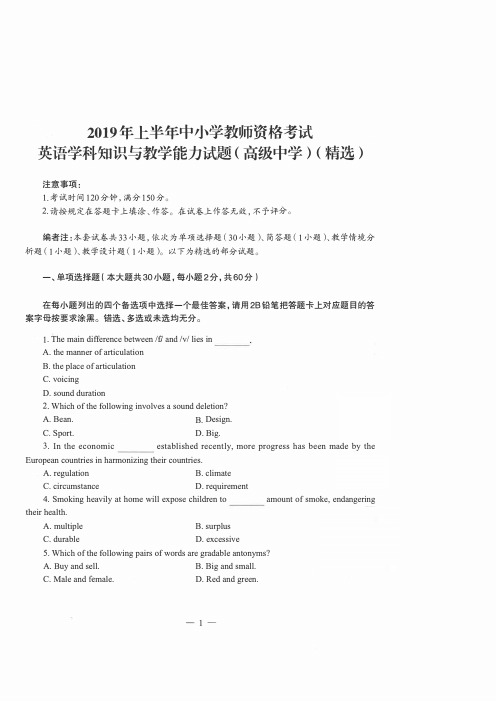
2019年上半年中小学教师资格考试英语学科知识与教学能力试题(高级中学)(精选)注意事项:1.考试时间120分钟,满分150分。
2.请按规定在答题卡上填涂、作答。
在试卷上作答无效,不予坪分。
编者注:本套试卷共33小题,依次为单项选择题(30小题)、简答题(1小题)、教学情境分析题(1小题)、教学设计题(1小题)。
以下为精选的部分试题。
一、单项选择题(本大题共30小题,每小题2分,共60分)在每小题列出的四个备选项中选择一个最佳答案,请用28铅笔把答题卡上对应题目的答案字母按要求涂黑。
错选、多选或未选均无分。
1. The main difference between /f/ and /v/ lies in A. the manner of articulationB. the place of articulationC. voicingD. sound duration 2. Which of the following involves a sound deletion?A. B ean.C.Sport. B. Design.D.Big.视频讲解3.In the economic established recently, more progress has been made by theEuropean countries in harmonizi吨their countries. A. regulation B. climate C.circumstanceD. requirement 4.Smoking heavily at home will expose children to their health. A. multiple C. durable B. surplusD. excessiveamount of smoke, endangering ’回5.Which of the following pairs of words are gradable antonyms?A. Buy and sell. B. B ig and small.C. Male and female. D. Red and green.一1一一6. Naturally, she see it.that once there was a new film everybody would be eager to go andA.had assumed R assumedC.has assumedD. was assuming7.Ifhe had fought in the First World War, he might have returnedA.a different manB. with a different manC.as a different manD. to be a different man8. In fact, they would rather have left for London in Birmingham.A.to stayB.in order to stayC. than have stayedD.instead of h aving stayed9.缺10.What kind of s peech act is perfo口ned in u忧erance “Come round on Saturday" when it issaid as an invitation rather than a demand? A.Direct speech act. B. Locutionary act.C.Indirect speech act.D. Perlocutionary act.11.By asking the question,“Can you list your f avorite f ood in E 昭lish ?”,the teacher is using thetechn i 叩e of A. elicitation C. prompting B. monitoringD.recasting12.If a teacher wants to check how much students have learned at the end of a te口n,he/shewould give them a(n)A. ·diagnostic testB. placement testC.proficiency testD. achievement test13. What learning style does Xiao Li exhibit if s he tries to understand eve叩single word when listening to a passage?A. Field-dependence.B. Intolerance of A mbiguity.C. Risk ”taking.D. Field-independence.14.If a teacher asks students to put jumbled sentences in order in a reading class, he/sheintends to develop their ability of .A. word-guessing through contextB. summarizing the main ideaC.understanding textual coherenceD. scanning for detailed information一2一for 15.When a teacher says “What do you mean by that ?”,he/she is asking the student A.repetition C.introduction B.suggestionD. clarificationI!)�即视频讲解16, When a teacher says “}切’d better talk in αmore polite way when speaking to theelderly.'’,he/she is drawing the s阳dents ’attention to the of language u 盹A.fluencyplexityC.accuracyD.app r opri acy17.Which of the following is a display question?A.What part of speech is “immense ”?B.How would you comment on this report?C.Why do you think Hemingway is a good writer?D.What do you think of the characters in this novel?A.Make some sentences with “how often ”.e “how often ”and the words given to make a sentence.C.I go shopping twice a week. How often do you go shopping?D.Please change the statement into a question with “how often ”.19.Which of the following are controlled activities in an English class?A.Reporting, role-play and games.B.Reading aloud, dictation and translation.C.Role-play, problem solving and discussion.rmation exchange, narration and interview.20.The is designed according to the mo叩hological and syntactic aspects of a language.A.structural syllabusB.situational syllabusC.skill-based syllabusD.content-based syllabus请阅读Passage 1,完成第21~25小题。
2019英语学科知识与教学能力(高中)必背

英语学科知识与教学能力(高中)必背考点第二部分语言教学知识与能力第一章外语教学基本理论第二节英语教学法一语法翻译法(grammar translation method)(一)@(二)语言观:语言是书面语,语言是一种知识,是由语音,语法和词汇构成的符号体系。
(外语教学法史上最早的一个教学法体系)(三)教学目的:培养学生阅读外国文学作品的能力和模仿范文进行写作的能力(四)特点是:教师用母语授课,授课重点是讲解与分析句子成分和语音、词汇变化与语法规则。
(五)评价优点:母语翻译,强调语法学习,深刻理解外语抽象词义和复杂结构缺点:1. 忽视口语教学,学生的语音语调差,不利于培养学生用外语进行交际的能力;{2. 教学方式单一,学生容易失去兴趣。
二直接法(direct method)(一)语言观:语言是一种技能或习惯,习惯的养成要靠大量的重复练习和模仿(二)教学目的:培养学生阅读外国文学作品的能力和模仿范文进行写作的能力。
(三)特点:直接学习,直接理解和直接应用(四)评价优点:`1. 采用各种直观教具,接近实际生活,培养用外语思维能力;2. 注重语言实践练习,学生学习积极性高,学习兴趣浓厚;3. 重视口语和语音教学,能有效地培养学生的语言运用能力。
缺点:1. 排斥母语,使学生对一些抽象和复杂的概念难以理解;2. 没有明晰的语法解释,导致学生说出的话语法错误较多。
三听说法(audio-lingual method)(一)<(二)语言观:语言是口语,是说出来的话,而不是写出来的文字。
(三)特点:以句型操练为中心,着重培养儿童听说能力的外语教学法。
(四)评价优点:培养学生敢于大胆主动地使用所学语言进行交谈,口语能力较强;重听说,初级阶段帮助大,语音语调自然。
缺点:机械操练不利于发展创造性思维,重形式,轻读写,语境不利于灵活应用。
;四情景法(the situational approach)(一)概念:情景法也叫视听法。
卓顶精文2019年上半年教师资格考试-英语学科知识与教学能力试题(高级中学)

2019年上半年中小学和幼儿园教师资格考试英语学科知识与教学能力试题(高级中学)一、单项选择题(本大题共30小题,每小题2分,共60分)1.“The”inthephrase thedignityandthehonoris pronounced____respectively.【真题1】(2019上)____A.[ðə][ðɪ]B.[ðɪ][ðə]C.[ðəː][ðiː]D.[ðiː][ðəː]2./k/isnotfullypronouncedin____.A.parkB.bicycleC.keyD.picture3.Takingphotographsofindividualsinprivateplaceswithouttheirconsent isnotacceptable,unless____bythepublicinterest.A.justifiedB.freedC.pardonedD.forgiven4.Thenewly-marriedcouplewantedtofindahotelthatservicesgoodfoodandhasa bitof____aswell.A.conditionsB.situationsC.environmentD.atmospherestSundayshecametovisitusoutoftheblue.Theitalicizedphrasemeans____.A.unexpectlyB.unhappilyC.untidilyD.unofficially6.—Whathappenedtotheglass?—____.A.Theglassisbroken.B.Theglasswasbroken.C.Tombroketheglass.D.Tomhastheglass.7.There____,themeettocomeispostphoned.A.isB.hasbeenC.beingD.tobe8.Itseemsthatshewasthereattheconferencemeans____.A.Sheseemstobethereattheconference.B.Sheseemedtobethereattheconference.C.Sheseemstohavebeenthereattheconference.D.Sheseemstobeingthereattheconference.9.Thephenomenonof____maybethefactortocausethefewestchangesintheEnglishlanguageinrecentyear s.A.movingtowardgreaterinformalityB.theinfluenceofAmericanEnglishC.theinfluenceofscienceandtechnologyD.theconflictsbetweenoramongnations10.AccordingtoNoamChomsry,humanbeingsarebornwithaninnateabilitytoacqu ireandproduceknowledgeas____.A.CATB.MRIC.TGD11.Whenlearnerscomeacrossnewwords,theyarerequiredtofocuson____.A.spellingB.semanticfeaturesC.form,meaninganduseD.wordformation12.Whichofthefollowingisnotexhibitedbythedeductivemethod?A.Itsavestime.B.Itpaysmoreattentiontoform.C.Itteachesgrammarinadecontextualizedway.D.Itencouragesstudentstoworkoutthegrammaticalrules.13.WhichofthefollowingmaterialsinNOTappropriateforateachertouseinlist eningpractice?A.Materialswithdifferentdialects.prehensibleauthenticmaterials.C.Materialswithcomprehensiblenewwordsforstudents.D.Materialswithcontentsbeyondstudents’comprehensioncapacity.14.____maybedefinedasanykindofengagingwiththelanguageonthepartofthelearners, usuallyundertheteacher’ssupervision,whoseprimaryobjectiveistoconsoli datelearning.A.PresentationB.PracticeC.ProductionD.Preparation15.Teachersbelievinginthe____modelinageneralsenseusuallyfollowthesequenceofteachingnewwords,senten cesandthenthewholepassageinthereadingclass.A.interactiveB.top-downC.bottom-upD.interactional16.The____approachtowritingteachingpaysattentiontonotonlywhattowrite,butalsohow towrite.A.product-orientedB.process-orientedC.form-focusedD.meaning-focused17.Theactivieyof____maymaximizethepossibilityofelicitingideas,wordsorconceptsfromstudents whenitisfocusedonagiventopic.A.retellingB.assessingoutputC.brainstormingD.checkingcomprehension18.____helpsstudentsfacilitatetheirprocessofaccumulatingvocabulary,broadenin gscopeofvision,andincreasingtargetlanguageexposure.A.ScanningB.SkimmingC.ExtensivereadingD.Intensivereading19.Whichofthefollowingnominatingpatternscanateacheradopttoensurethata llstudentsareactivelyinvolvedinclassroomactivities?A.NominatingthosewhoaregoodatEnglish.B.Askingquestionsinapredicablesequence.C.Nominatingstudentsafterthequestionisgiven.D.Nominatingstudentsbeforegivingthequestion.20.Ifateacherasks“Whatdoes“correctivefeedback”mean?”,thistypeofquesti oniscalled____.A.referentialquestonsB.tagquestionsC.rhetoricalquestionsD.displayquestions请阅读Passage1,完成21~25小题。
【教师资格考试真题】2019年下半年教师资格考试高中英语真题试卷
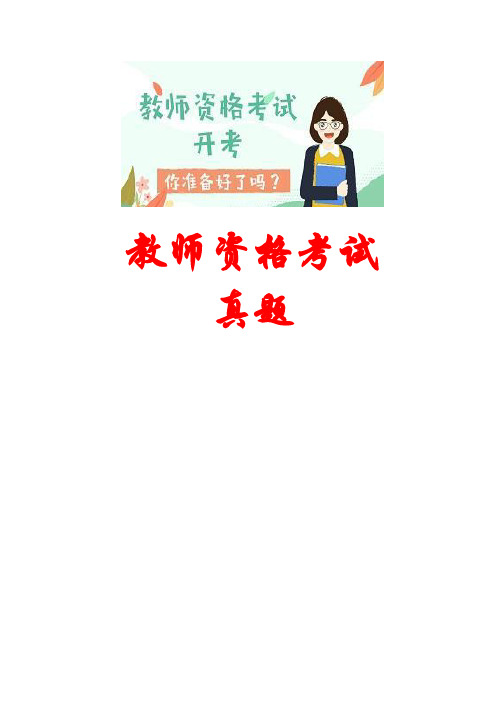
教师资格考试真题2019年下半年中小学教师资格考试真题试卷(精编)《英语学科知识与教学能力》(高级中学)一、单项选择题(本大题共20小题每小题2分共40分)()1.This disease________itself in yellowness of the skin and eyes.A.manifestsB.modifiesC.magnifiesD.exposes()2.In the________of human life honors and rewards tend to fall to those who show their good qualities in action.A.ringB.terraceC.arenaD.ground()3.The coupon________you to at least50%off the regular price of either frames or lenses when you buy both.A.entitlesB.tipsC.presentsD.credits()4.Which of the following indicates a correct intonation pattern?A.Did you have a↑fever or a↓headache?B.Did you have a↑fever or a↑headache?C.Did you have a↓fever or a↓headache?D.Did you have a↓fever or a↑headache?()5.Which of the following is a voiceless bilabial stop?A./b/B./m/C./w/D./p/()6.The experienced writer is skilled in handling his words just________the builder is skilled in handling his bricks.A.asB.soC.thusD.like()7.It is politely requested by the hotel management that radios________after10 o’clock at night.A.did not playB.not to playC.not be playedD.were not be played()8.Which of the following italicized phrase indicates a purpose?A.She said it for fun,but others took it seriously.B.For all its efforts,the team didn’t win the match.C.Linda has worked for the firms for20years.D.He set out for Beijing yesterday.()9.There are________syllables and________phonemes in the word “determine”.A.38B.37C.26D.36()10.The pair of words“buy”and“sell”are________opposites.A.gradableB.relationalplementaryD.dialectal()11.The inductive method differs from the deductive one in that it enables learners to arrive at________on the basis of examples.A.generalizationsB.solutionsC.understandingD.decision()12.What is not the major purpose of asking students to give a report after the group discussion in a reading class?A.To pool ideasB.To correct mistakesC.To encourage language useD.To practice oral English()13.Which of the following is a kind of information gap activities in class?A.Pattern drillsB.Making a surveyC.Sentence transformationD.Forming sentences()14.What would a teacher ask students to do if he/she intends to develop their skimming skill?A.To rewrite the textB.To read for specific informationC.To predict the context of the textD.To read for the general idea of the text()15.What does a teacher focus on if he/she asks students to list their ideas select and expand those ideas and then make an outline?A.Students’reading skillsB.Students’translating skillsC.Students’writing skillsD.Students’listening skills()16.Activities such as problem solving decision making and opinion exchanging are typical practices in________.A.Audio-lingual methodB.Grammar-translation methodC.Situation language teachingD.Task-based language teaching()17.What type of questions is more likely to motivate learners to talk more and get new information?A.Yes-no questionB.Closed questionC.Referential questionD.Display question()18.What does a teacher focus on when he/she says"find out two things your partner likes to eat but you don't and two things you both like to eat using what do you like to eat?A.FormB.MeaningC.Meaning and useD.Form and meaning()19.Which of the following activities is most likely to be used to encourage students active language use?A.Reading a text and making true or false judgementB.Listening to a passage and filling in the blankC.Doing a role play of opening a bank accountD.Reordering the sentences into a passage()20.What test is likely to be given to new students at the beginning of a semester to screen them?A.Achievement testB.Placement testC.Proficiency testD.Aptitude test二简答题(本大题共1小题,共20分)21.在写作教学过程中写前写中写后是三个重要的教学环节简述每个环节中的一个教学活动(12分),列出教师在写作教学过程中需要注意的四个事项(8分)。
《英语学科知识与教学能力》高级中学

《英语学科知识与教学能力》(高级中学)一、考试目标1.英语学科知识与能力具有扎实的英语语言基础知识和语言能力;具备从事高中英语教学所需要的英语语言能力;能理解有关英语国家的语言、历史和文化等相关知识。
2.英语学科教学知识与能力掌握外语教学基本理论、英语教学专业知识与国家英语课程标准内容等学科教学知识,并能用以指导高中英语教学。
3.英语学科教学设计能力能够根据英语学科特点,针对高中学生的认知特点、语言水平和学习需要选择并设计合理的教学内容,形成完整合理的教学方案。
4.英语学科教学实施能力理解高中英语课堂教学实施的基本原则和方法,具备实施语言课堂教学的基本能力;能够根据教学设计,结合教学实际情况,采用恰当的教学手段,引导学生进行有效学习。
5.英语学科教学评价知识与能力了解高中英语课堂教学评价的基本知识和方法,能够对学生的语言学习进行恰当的评价;了解教学反思的基本方法和策略,能够对自己的课堂教学实践进行反思,提出改进的思路。
二、考试模块内容与要求(一)语言知识与能力1.掌握英语语言的基础知识,了解语言学研究中与语言教学相关的基本概念和知识,并能在课堂教学中加以运用。
2.具有良好的英语语言运用能力,包括用英语进行书面表达、获取教学资源和信息、表达思想情感和与学生良好沟通的能力;能够筛选并改编适合高中学生英语水平的语言材料。
3.能在语篇中理解英语国家的语言、历史和文学等相关的社会文化知识。
(二)语言教学知识与能力1.了解外语教学基本理论,理解语言观、语言学习观、语言教学观等对高中英语教学的指导作用。
2.理解国家颁布的英语学科课程标准的目标内容(语言技能、语言知识、情感态度、学习策略和文化意识),以及课程标准的其他相关知识,并能在教学设计与实施中运用。
3.掌握英语语言知识(语音、词汇、语法、语篇等)的教学基本原则、讲解和练习方法。
4.掌握英语语言技能(听、说、读、写)教学的基本原则和训练方法。
5.能结合中外社会文化语境,设计并实施英语知识和技能的教学与训练。
《英语学科知识与教学能力》(高级中学)_4

《英语学科知识与教学能力》(高级中学)一、考试目标1.英语学科知识与能力具有扎实的英语语言基础知识和语言能力;具备从事高中英语教学所需要的英语语言能力;能理解有关英语国家的语言、历史和文化等相关知识。
2.英语学科教学知识与能力掌握外语教学基本理论、英语教学专业知识与国家英语课程标准内容等学科教学知识,并能用以指导高中英语教学。
3.英语学科教学设计能力能够根据英语学科特点,针对高中学生的认知特点、语言水平和学习需要选择并设计合理的教学内容,形成完整合理的教学方案。
4.英语学科教学实施能力理解高中英语课堂教学实施的基本原则和方法,具备实施语言课堂教学的基本能力;能够根据教学设计,结合教学实际情况,采用恰当的教学手段,引导学生进行有效学习。
5.英语学科教学评价知识与能力了解高中英语课堂教学评价的基本知识和方法,能够对学生的语言学习进行恰当的评价;了解教学反思的基本方法和策略,能够对自己的课堂教学实践进行反思,提出改进的思路。
二、考试模块内容与要求(一)语言知识与能力1.掌握英语语言的基础知识,了解语言学研究中与语言教学相关的基本概念和知识,并能在课堂教学中加以运用。
2.具有良好的英语语言运用能力,包括用英语进行书面表达、获取教学资源和信息、表达思想情感和与学生良好沟通的能力;能够筛选并改编适合高中学生英语水平的语言材料。
3.能在语篇中理解英语国家的语言、历史和文学等相关的社会文化知识。
(二)语言教学知识与能力1.了解外语教学基本理论,理解语言观、语言学习观、语言教学观等对高中英语教学的指导作用。
2.理解国家颁布的英语学科课程标准的目标内容(语言技能、语言知识、情感态度、学习策略和文化意识),以及课程标准的其他相关知识,并能在教学设计与实施中运用。
3.掌握英语语言知识(语音、词汇、语法、语篇等)的教学基本原则、讲解和练习方法。
4.掌握英语语言技能(听、说、读、写)教学的基本原则和训练方法。
5.能结合中外社会文化语境,设计并实施英语知识和技能的教学与训练。
《英语学科知识与教学能力》高级中学
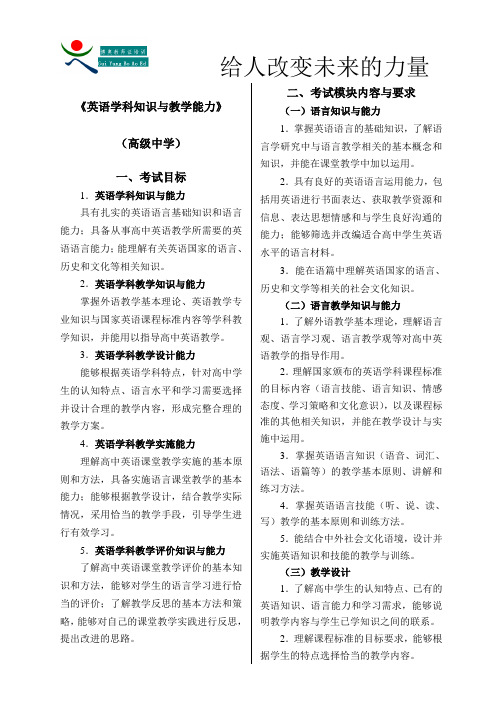
《英语学科知识与教学能力》(高级中学)一、考试目标1.英语学科知识与能力具有扎实的英语语言基础知识和语言能力;具备从事高中英语教学所需要的英语语言能力;能理解有关英语国家的语言、历史和文化等相关知识。
2.英语学科教学知识与能力掌握外语教学基本理论、英语教学专业知识与国家英语课程标准内容等学科教学知识,并能用以指导高中英语教学。
3.英语学科教学设计能力能够根据英语学科特点,针对高中学生的认知特点、语言水平和学习需要选择并设计合理的教学内容,形成完整合理的教学方案。
4.英语学科教学实施能力理解高中英语课堂教学实施的基本原则和方法,具备实施语言课堂教学的基本能力;能够根据教学设计,结合教学实际情况,采用恰当的教学手段,引导学生进行有效学习。
5.英语学科教学评价知识与能力了解高中英语课堂教学评价的基本知识和方法,能够对学生的语言学习进行恰当的评价;了解教学反思的基本方法和策略,能够对自己的课堂教学实践进行反思,提出改进的思路。
二、考试模块内容与要求(一)语言知识与能力1.掌握英语语言的基础知识,了解语言学研究中与语言教学相关的基本概念和知识,并能在课堂教学中加以运用。
2.具有良好的英语语言运用能力,包括用英语进行书面表达、获取教学资源和信息、表达思想情感和与学生良好沟通的能力;能够筛选并改编适合高中学生英语水平的语言材料。
3.能在语篇中理解英语国家的语言、历史和文学等相关的社会文化知识。
(二)语言教学知识与能力1.了解外语教学基本理论,理解语言观、语言学习观、语言教学观等对高中英语教学的指导作用。
2.理解国家颁布的英语学科课程标准的目标内容(语言技能、语言知识、情感态度、学习策略和文化意识),以及课程标准的其他相关知识,并能在教学设计与实施中运用。
3.掌握英语语言知识(语音、词汇、语法、语篇等)的教学基本原则、讲解和练习方法。
4.掌握英语语言技能(听、说、读、写)教学的基本原则和训练方法。
5.能结合中外社会文化语境,设计并实施英语知识和技能的教学与训练。
2019下半年教师资格《英语学科知识与教学能力(高中》试题
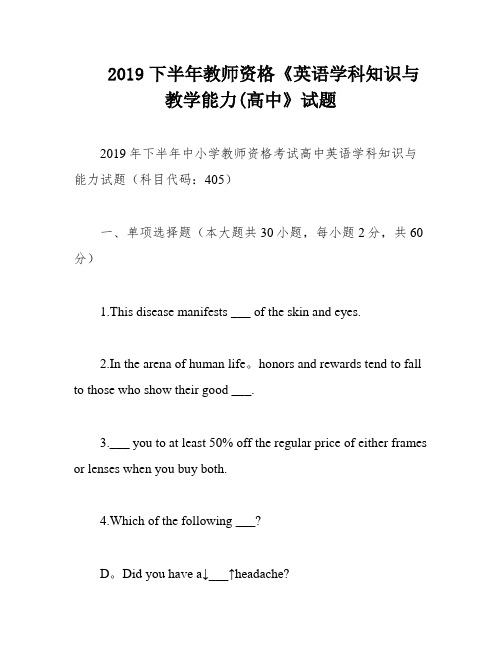
2019下半年教师资格《英语学科知识与教学能力(高中》试题2019年下半年中小学教师资格考试高中英语学科知识与能力试题(科目代码:405)一、单项选择题(本大题共30小题,每小题2分,共60分)1.This disease manifests ___ of the skin and eyes.2.In the arena of human life。
honors and rewards tend to fall to those who show their good ___.3.___ you to at least 50% off the regular price of either frames or lenses when you buy both.4.Which of the following ___?D。
Did you have a↓___↑headache?5.Which of the following is a voiceless ___?D。
/p/6.___ ___ his words。
just as the builder is ___.13.Which of the following activities in class involves an n gap?A。
___.___.14.If ___' skimming skill。
what would he/she ask them to do?A。
Rewrite the text.B。
Read for specific n.C。
Predict the content of the text.D。
Read for the general idea of the text.15.If a teacher asks students to list their ideas。
select and expand on them。
《英语学科知识与教学能力》高级中学

《英语学科知识与教学能力》(高级中学)一、考试目标1.英语学科知识与能力具有扎实的英语语言基础知识和语言能力;具备从事高中英语教学所需要的英语语言能力;能理解有关英语国家的语言、历史和文化等相关知识。
2.英语学科教学知识与能力掌握外语教学基本理论、英语教学专业知识与国家英语课程标准内容等学科教学知识,并能用以指导高中英语教学。
3.英语学科教学设计能力能够根据英语学科特点,针对高中学生的认知特点、语言水平和学习需要选择并设计合理的教学内容,形成完整合理的教学方案。
4.英语学科教学实施能力理解高中英语课堂教学实施的基本原则和方法,具备实施语言课堂教学的基本能力;能够根据教学设计,结合教学实际情况,采用恰当的教学手段,引导学生进行有效学习。
5.英语学科教学评价知识与能力了解高中英语课堂教学评价的基本知识和方法,能够对学生的语言学习进行恰当的评价;了解教学反思的基本方法和策略,能够对自己的课堂教学实践进行反思,提出改进的思路。
二、考试模块内容与要求(一)语言知识与能力1.掌握英语语言的基础知识,了解语言学研究中与语言教学相关的基本概念和知识,并能在课堂教学中加以运用。
2.具有良好的英语语言运用能力,包括用英语进行书面表达、获取教学资源和信息、表达思想情感和与学生良好沟通的能力;能够筛选并改编适合高中学生英语水平的语言材料。
3.能在语篇中理解英语国家的语言、历史和文学等相关的社会文化知识。
(二)语言教学知识与能力1.了解外语教学基本理论,理解语言观、语言学习观、语言教学观等对高中英语教学的指导作用。
2.理解国家颁布的英语学科课程标准的目标内容(语言技能、语言知识、情感态度、学习策略和文化意识),以及课程标准的其他相关知识,并能在教学设计与实施中运用。
3.掌握英语语言知识(语音、词汇、语法、语篇等)的教学基本原则、讲解和练习方法。
4.掌握英语语言技能(听、说、读、写)教学的基本原则和训练方法。
5.能结合中外社会文化语境,设计并实施英语知识和技能的教学与训练。
《英语学科知识与教学能力》(高级中学)
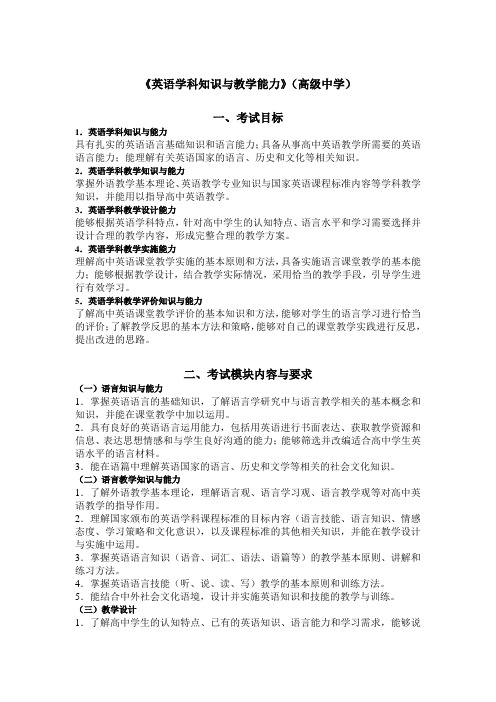
《英语学科知识与教学能力》(高级中学)一、考试目标1.英语学科知识与能力具有扎实的英语语言基础知识和语言能力;具备从事高中英语教学所需要的英语语言能力;能理解有关英语国家的语言、历史和文化等相关知识。
2.英语学科教学知识与能力掌握外语教学基本理论、英语教学专业知识与国家英语课程标准内容等学科教学知识,并能用以指导高中英语教学。
3.英语学科教学设计能力能够根据英语学科特点,针对高中学生的认知特点、语言水平和学习需要选择并设计合理的教学内容,形成完整合理的教学方案。
4.英语学科教学实施能力理解高中英语课堂教学实施的基本原则和方法,具备实施语言课堂教学的基本能力;能够根据教学设计,结合教学实际情况,采用恰当的教学手段,引导学生进行有效学习。
5.英语学科教学评价知识与能力了解高中英语课堂教学评价的基本知识和方法,能够对学生的语言学习进行恰当的评价;了解教学反思的基本方法和策略,能够对自己的课堂教学实践进行反思,提出改进的思路。
二、考试模块内容与要求(一)语言知识与能力1.掌握英语语言的基础知识,了解语言学研究中与语言教学相关的基本概念和知识,并能在课堂教学中加以运用。
2.具有良好的英语语言运用能力,包括用英语进行书面表达、获取教学资源和信息、表达思想情感和与学生良好沟通的能力;能够筛选并改编适合高中学生英语水平的语言材料。
3.能在语篇中理解英语国家的语言、历史和文学等相关的社会文化知识。
(二)语言教学知识与能力1.了解外语教学基本理论,理解语言观、语言学习观、语言教学观等对高中英语教学的指导作用。
2.理解国家颁布的英语学科课程标准的目标内容(语言技能、语言知识、情感态度、学习策略和文化意识),以及课程标准的其他相关知识,并能在教学设计与实施中运用。
3.掌握英语语言知识(语音、词汇、语法、语篇等)的教学基本原则、讲解和练习方法。
4.掌握英语语言技能(听、说、读、写)教学的基本原则和训练方法。
5.能结合中外社会文化语境,设计并实施英语知识和技能的教学与训练。
《英语学科知识与教学能力》高级中学
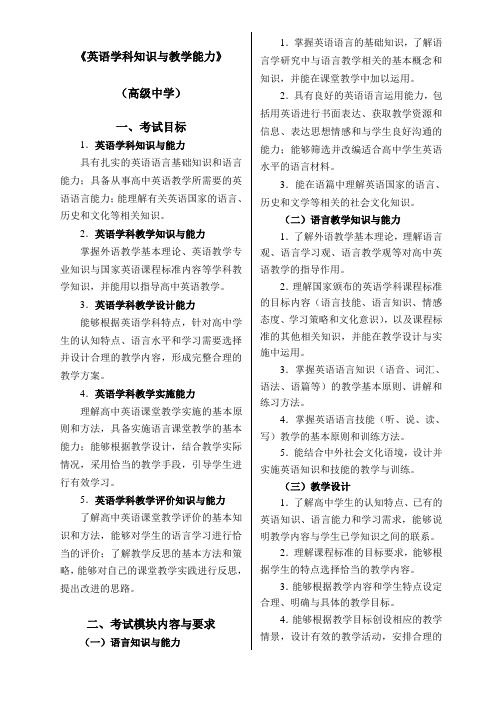
《英语学科知识与教学能力》(高级中学)一、考试目标1.英语学科知识与能力具有扎实的英语语言基础知识和语言能力;具备从事高中英语教学所需要的英语语言能力;能理解有关英语国家的语言、历史和文化等相关知识。
2.英语学科教学知识与能力掌握外语教学基本理论、英语教学专业知识与国家英语课程标准内容等学科教学知识,并能用以指导高中英语教学。
3.英语学科教学设计能力能够根据英语学科特点,针对高中学生的认知特点、语言水平和学习需要选择并设计合理的教学内容,形成完整合理的教学方案。
4.英语学科教学实施能力理解高中英语课堂教学实施的基本原则和方法,具备实施语言课堂教学的基本能力;能够根据教学设计,结合教学实际情况,采用恰当的教学手段,引导学生进行有效学习。
5.英语学科教学评价知识与能力了解高中英语课堂教学评价的基本知识和方法,能够对学生的语言学习进行恰当的评价;了解教学反思的基本方法和策略,能够对自己的课堂教学实践进行反思,提出改进的思路。
二、考试模块内容与要求(一)语言知识与能力1.掌握英语语言的基础知识,了解语言学研究中与语言教学相关的基本概念和知识,并能在课堂教学中加以运用。
2.具有良好的英语语言运用能力,包括用英语进行书面表达、获取教学资源和信息、表达思想情感和与学生良好沟通的能力;能够筛选并改编适合高中学生英语水平的语言材料。
3.能在语篇中理解英语国家的语言、历史和文学等相关的社会文化知识。
(二)语言教学知识与能力1.了解外语教学基本理论,理解语言观、语言学习观、语言教学观等对高中英语教学的指导作用。
2.理解国家颁布的英语学科课程标准的目标内容(语言技能、语言知识、情感态度、学习策略和文化意识),以及课程标准的其他相关知识,并能在教学设计与实施中运用。
3.掌握英语语言知识(语音、词汇、语法、语篇等)的教学基本原则、讲解和练习方法。
4.掌握英语语言技能(听、说、读、写)教学的基本原则和训练方法。
5.能结合中外社会文化语境,设计并实施英语知识和技能的教学与训练。
《英语学科知识与教学能力》(高级中学)

《英语学科知识与教学能力》(高级中学)一、考试目标1.英语学科知识与能力具有扎实的英语语言基础知识和语言能力;具备从事高中英语教学所需要的英语语言能力;能理解有关英语国家的语言、历史和文化等相关知识。
2.英语学科教学知识与能力掌握外语教学基本理论、英语教学专业知识与国家英语课程标准内容等学科教学知识,并能用以指导高中英语教学。
3.英语学科教学设计能力能够根据英语学科特点,针对高中学生的认知特点、语言水平和学习需要选择并设计合理的教学内容,形成完整合理的教学方案。
4.英语学科教学实施能力理解高中英语课堂教学实施的基本原则和方法,具备实施语言课堂教学的基本能力;能够根据教学设计,结合教学实际情况,采用恰当的教学手段,引导学生进行有效学习。
5.英语学科教学评价知识与能力了解高中英语课堂教学评价的基本知识和方法,能够对学生的语言学习进行恰当的评价;了解教学反思的基本方法和策略,能够对自己的课堂教学实践进行反思,提出改进的思路。
二、考试模块内容与要求(一)语言知识与能力1.掌握英语语言的基础知识,了解语言学研究中与语言教学相关的基本概念和知识,并能在课堂教学中加以运用。
2.具有良好的英语语言运用能力,包括用英语进行书面表达、获取教学资源和信息、表达思想情感和与学生良好沟通的能力;能够筛选并改编适合高中学生英语水平的语言材料。
3.能在语篇中理解英语国家的语言、历史和文学等相关的社会文化知识。
(二)语言教学知识与能力1.了解外语教学基本理论,理解语言观、语言学习观、语言教学观等对高中英语教学的指导作用。
2.理解国家颁布的英语学科课程标准的目标内容(语言技能、语言知识、情感态度、学习策略和文化意识),以及课程标准的其他相关知识,并能在教学设计与实施中运用。
3.掌握英语语言知识(语音、词汇、语法、语篇等)的教学基本原则、讲解和练习方法。
4.掌握英语语言技能(听、说、读、写)教学的基本原则和训练方法。
5.能结合中外社会文化语境,设计并实施英语知识和技能的教学与训练。
教师考试大纲《英语学科知识与教学能力》(高级中学)(完美版)
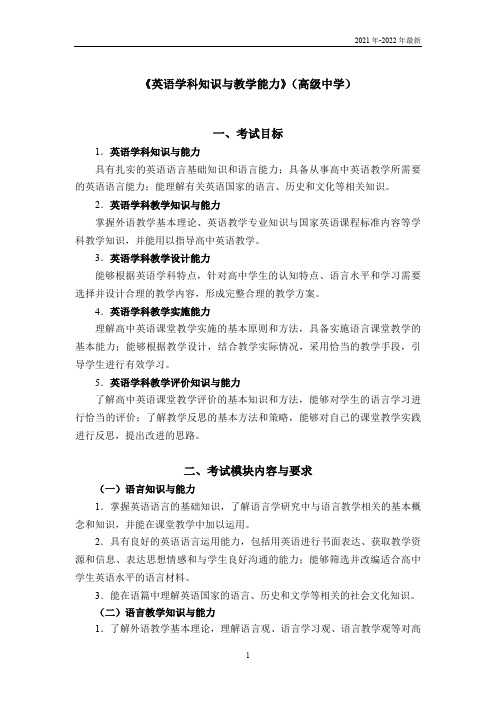
《英语学科知识与教学能力》(高级中学)一、考试目标1.英语学科知识与能力具有扎实的英语语言基础知识和语言能力;具备从事高中英语教学所需要的英语语言能力;能理解有关英语国家的语言、历史和文化等相关知识。
2.英语学科教学知识与能力掌握外语教学基本理论、英语教学专业知识与国家英语课程标准内容等学科教学知识,并能用以指导高中英语教学。
3.英语学科教学设计能力能够根据英语学科特点,针对高中学生的认知特点、语言水平和学习需要选择并设计合理的教学内容,形成完整合理的教学方案。
4.英语学科教学实施能力理解高中英语课堂教学实施的基本原则和方法,具备实施语言课堂教学的基本能力;能够根据教学设计,结合教学实际情况,采用恰当的教学手段,引导学生进行有效学习。
5.英语学科教学评价知识与能力了解高中英语课堂教学评价的基本知识和方法,能够对学生的语言学习进行恰当的评价;了解教学反思的基本方法和策略,能够对自己的课堂教学实践进行反思,提出改进的思路。
二、考试模块内容与要求(一)语言知识与能力1.掌握英语语言的基础知识,了解语言学研究中与语言教学相关的基本概念和知识,并能在课堂教学中加以运用。
2.具有良好的英语语言运用能力,包括用英语进行书面表达、获取教学资源和信息、表达思想情感和与学生良好沟通的能力;能够筛选并改编适合高中学生英语水平的语言材料。
3.能在语篇中理解英语国家的语言、历史和文学等相关的社会文化知识。
(二)语言教学知识与能力1.了解外语教学基本理论,理解语言观、语言学习观、语言教学观等对高中英语教学的指导作用。
2.理解国家颁布的英语学科课程标准的目标内容(语言技能、语言知识、情感态度、学习策略和文化意识),以及课程标准的其他相关知识,并能在教学设计与实施中运用。
3.掌握英语语言知识(语音、词汇、语法、语篇等)的教学基本原则、讲解和练习方法。
4.掌握英语语言技能(听、说、读、写)教学的基本原则和训练方法。
5.能结合中外社会文化语境,设计并实施英语知识和技能的教学与训练。
- 1、下载文档前请自行甄别文档内容的完整性,平台不提供额外的编辑、内容补充、找答案等附加服务。
- 2、"仅部分预览"的文档,不可在线预览部分如存在完整性等问题,可反馈申请退款(可完整预览的文档不适用该条件!)。
- 3、如文档侵犯您的权益,请联系客服反馈,我们会尽快为您处理(人工客服工作时间:9:00-18:30)。
《英语学科知识与教学能力》(高级中学)一、考试目标1.英语学科知识与能力具有扎实的英语语言基础知识和语言能力;具备从事高中英语教学所需要的英语语言能力;能理解有关英语国家的语言、历史和文化等相关知识。
2.英语学科教学知识与能力掌握外语教学基本理论、英语教学专业知识与国家英语课程标准内容等学科教学知识,并能用以指导高中英语教学。
3.英语学科教学设计能力能够根据英语学科特点,针对高中学生的认知特点、语言水平和学习需要选择并设计合理的教学内容,形成完整合理的教学方案。
4.英语学科教学实施能力理解高中英语课堂教学实施的基本原则和方法,具备实施语言课堂教学的基本能力;能够根据教学设计,结合教学实际情况,采用恰当的教学手段,引导学生进行有效学习。
5.英语学科教学评价知识与能力了解高中英语课堂教学评价的基本知识和方法,能够对学生的语言学习进行恰当的评价;了解教学反思的基本方法和策略,能够对自己的课堂教学实践进行反思,提出改进的思路。
二、考试模块内容与要求(一)语言知识与能力1.掌握英语语言的基础知识,了解语言学研究中与语言教学相关的基本概念和知识,并能在课堂教学中加以运用。
2.具有良好的英语语言运用能力,包括用英语进行书面表达、获取教学资源和信息、表达思想情感和与学生良好沟通的能力;能够筛选并改编适合高中学生英语水平的语言材料。
3.能在语篇中理解英语国家的语言、历史和文学等相关的社会文化知识。
(二)语言教学知识与能力1.了解外语教学基本理论,理解语言观、语言学习观、语言教学观等对高中英语教学的指导作用。
2.理解国家颁布的英语学科课程标准的目标内容(语言技能、语言知识、情感态度、学习策略和文化意识),以及课程标准的其他相关知识,并能在教学设计与实施中运用。
3.掌握英语语言知识(语音、词汇、语法、语篇等)的教学基本原则、讲解和练习方法。
4.掌握英语语言技能(听、说、读、写)教学的基本原则和训练方法。
5.能结合中外社会文化语境,设计并实施英语知识和技能的教学与训练。
(三)教学设计1.了解高中学生的认知特点、已有的英语知识、语言能力和学习需求,能够说明教学内容与学生已学知识之间的联系。
2.理解课程标准的目标要求,能够根据学生的特点选择恰当的教学内容。
3.能够根据教学内容和学生特点设定合理、明确与具体的教学目标。
4.能够根据教学目标创设相应的教学情景,设计有效的教学活动,安排合理的教学过程,筛选适当的辅助教学材料。
5.能够根据教学内容和教学过程,设计有效的学习评估活动。
(四)教学实施与评价1.掌握英语课堂教学的基本步骤与方法,能够创设教学情景,激发学习动机,引导学生参与语言学习活动。
2.掌握指导学生学习的方法和策略,能依据英语学科和学生的特点,根据教学实际情况,恰当地运用语言讲解、练习、提问、反馈等方法,帮助学生有效学习。
3.掌握课堂管理的基本方法,熟悉课堂活动的常用组织形式,能在教学活动中以学生为中心组织教学,能在课堂教学的不同阶段发挥教师的作用。
4.掌握课堂总结的方法,能适时地对教学内容进行归纳、总结与评价,科学合理地布置作业。
5.掌握基本的现代教育技术,能够针对不同的教学内容与教学目标,整合多种资源,选择恰当的辅助教学手段进行有效教学。
6.了解形成性评价和终结性评价的知识与方法,并在高中英语教学中合理运用。
7.了解教学案例评析的基本方法,能够对教学案例进行评价。
8.了解教学反思的基本方法和策略,能够对自己的教学进行反思并提出改进思路。
三、试卷结构四、题型示例I.语言知识与能力1.单项选择题(语言知识)(1)Thousands of ex-army officers have found _________ jobs in private security firms in the US.A.lucrative B.ludicrousC.longish D.lucky(2)The manager persuaded the team to play the game. What actually happened according to this statement?A.The manager played hard.B.The team played hard.C.The team actually did not play.D.The manager actually did not play.2.单项选择题(阅读理解)Human beings are an irritant to Mother Nature, and in spite of the fact that it took their brains five million years to evolve, She can rid Herself of them in an instant. This, however, may not be necessary, since humans seem to be racing to see if they can save Her the trouble. They behave so arrogantly, contending they are superior to Nature. Rain forests are being cut down or burned—not only polluting the air but also causing a drop in oxygen levels. The love affair people have with their automobiles, especially “gas hog” SUV’s, adds to the pollutants in the air and is, yet, another nail in their coffins. Since prehistoric times, humans have been stalking and killing animals, causing many, beginning with themastodon and saber-toothed tiger, to become extinct. Modern civilization is rushing headlong to slaughter animals in wholesale lots, all the while trying to prove its superiority to Mother Nature, usually with disastrous results.For thousands of years, humans also have been defacing the earth, making scars upon the land. The throngs of people who responded to the lure of gold in the Yukon totally stripped mountainsides of trees above the Yukon River to make rafts in order to sail 500 miles to Dawson. Forty percent never made it! In the populated areas of the Himalayas very few trees remain since the citizens have cut them down for cooking and heating fires. With most of the trees gone, erosion occurs on a large scale, washing away most of the topsoil, making food production difficult. Even more disturbing is the fact that, due to large-scale cutting, the famous cedars of Lebanon, mentioned in the Bible, no longer exist. Along the same lines, so much of the rain forest in Panama is being destroyed that scientists are predicting the Panama Canal could fill with silt, thus prohibiting ships from crossing the isthmus, due to the effects of deforestation.Deforestation and erosion, along with changing weather patterns, have led to the fastest-growing regions on this planet—deserts. All the while, populations are exploding worldwide and the proliferation of deserts means there is less arable land to feed the increasing number of people. Starvation on a massive scale will run rampant, and whenever a noted ecologist or environmentalist sends out warnings about such dangers to human life, very few consider giving up any of their conveniences. For instance, they insist on using aerosols and traveling one-to-a-car, thus adding to the emissions, which cause the ozone holes to expand, leading to more cases of skin cancer—a vicious cycle, indeed.To make matters even more critical, global warming is becoming an ever-increasing threat to the existence of humans and animals. Polar icecaps are melting, and sections, the size of the state of Rhode Island, are breaking off. Traveling toward the Temperate Zones, they begin to melt, placing an inordinate amount of fresh water into the oceans and causing an imbalance.Humans further complicate their lives by allowing businesses to release pollutants in urban areas, in the name of profit. “Accidents”often take place at refineries where toxic fumes are released into the air that people and animals breathe. Pesticides are so widely used and pose such a threat that it is amazing all of them haven’t been banned.Governments, anxious to appease money-hungry corporations and their stockholders, have allowed timber companies into National Forests to cut virgin-growth trees. Most of these businesses clear cut vast areas andoften wait an inordinate amount of time to replant.Burning questions never cease: When will governments—local, state, and federal—corporations, and the rest of the human race realize what is happening to this planet? When will the race for profit cease to consume them? Perhaps it will come about when there is no land left to farm and feed the burgeoning population, or there is no clean water left to drink, or wildlife to balance the ecosystem, or, more importantly, when their children start dying. By that time, however, it probably will be too late.1.In Paragraph 1, “another nail in their coffin”is similar in meaning to______.A.a bad luck B.going deadC.a blessing in disguise D.going from bad to worse2.The author purposefully capitalizes the initial letters of Mother Nature because ______.A.the author is clearly being sarcastic and suggesting that human beings show no respect for the natureB.the author wants to emphasize the point that nature, like our mother, provides us with nourishmentC.they are used here as a proper noun personifying the might power of natureD.they are words of very special importance3.The author implies that travelling one-to-a-car______.A.is an environmentally-friendly travel optionB.should be discouragedC.should be encouragedD.should be punishedII.语言教学知识与能力1.单项选择题Which of the following activities belongs in communicative practice?A.Repeating sentences that the teacher says.B.Doing oral grammar drills.C.Reading aloud passages from the textbook.D.Giving instructions so that someone can use a new machine.2.简答题(中文作答)(1)请辨析下列两个句子的不同点并解释原因。
